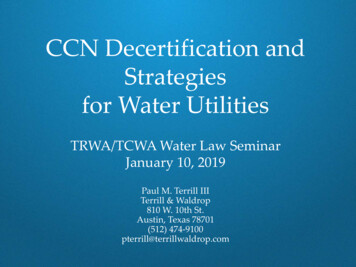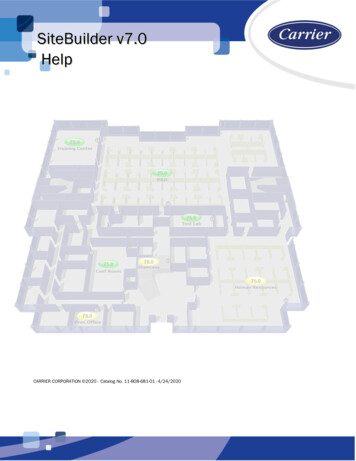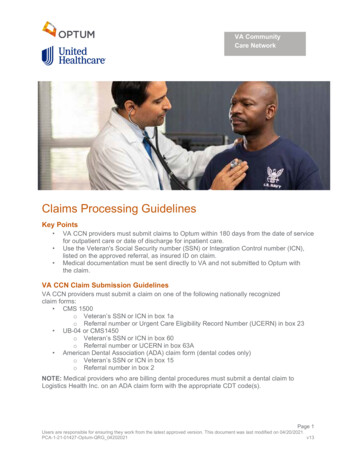
Transcription
CCN Decertification andStrategiesfor Water UtilitiesTRWA/TCWA Water Law SeminarJanuary 10, 2019Paul M. Terrill IIITerrill & Waldrop810 W. 10th St.Austin, Texas 78701(512) 474-9100pterrill@terrillwaldrop.com
Overview The Problem: PUC decertification ofutility CCNs by cities anddevelopers is easy and rarely resultsin meaningful compensation Response: Protection of servicearea through 7 U.S.C. § 1926(b) andfederal court Key Takeaways2
The ProblemPUC decertification of water andwastewater utility CCNs by citiesand developers is practicallyautomatic. . .And the PUC rarely awards anycompensation for the lost servicearea3
Overview of KeyDecertificationStatutes4
Certificates of Convenienceand Necessity What is a CCN? PUC certificate that grants the exclusive rightand mandatory duty to provide retail water andwastewater service to a geographic area Applicability Required for private utilities (IOUs) and mostnonprofit WSCs Discretionary for governmental providers suchas special utility districts5
Rationale for CCNs Certainty of customer base providesincentive to invest in regionalinfrastructure for future growth. Enables utilities to obtain financing forimprovements. Regulation by PUC is intended to operateas a substitute for competition. Allows for economies of scale andefficiency, resulting in lower costs.6
Four Basic Types of Decertification13.254 (a)“for cause” decertification13.254 (a-1)“expedited release” requires an alternate serviceprovider that comparesfavorably (cost, fire flow, etc.)13.254 (a-5)“streamlined expedited release” without cause13.255“single certification” without cause7
History of Decertification Statutes1980s – Early Decertification Statutes§13.255 - Primarily to address problems with coloniasin South Texas that could not be served by nearbymunicipal providers due to CCNs.1. Permitted single certification for municipalitiesafter annexation and notice to CCN holder2. Required just compensation for propertyrendered useless or valueless3. Only applied to water supply corporations expanded to include special utility districts andprivate utilities wholly within a municipality of1.7 million or more8
History of Decertification Statutes1990s – Expansion of decertification for “bad actors”§13.254(a) Set up decertification and compensationprocess applicable to all CCN holders.Availability: notice and hearing required§13.254(a)(1) Decertification Criteria: CCN holder has never provided, is no longerproviding, is incapable of providing, or hasfailed to provide continuous and adequateserviceCompensation: lost future revenueResult: very few decertifications9
History of Decertification Statutes2005 – Three Significant Changes1.CCNs made harder to obtain Landowners provided notice of newCCN and given opportunity to “optout”2.Compensation portions of both §13.254and §13.255 were revised Lost future revenues not recoverable3.Expedited release process added –§13.254(a-1)10
§ 13.254(a-1) Expedited DecertificationLimited right for landowners to release property from existingCCN At least 50 acres Not in a platted subdivision receiving water or sewer serviceCriteria: CCN holder refuses to provide service CCN holder is not capable of providing service within thetimeframe, at the level, or in the manner reasonablyrequested CCN holder conditions the provision of service on paymentof costs not properly allocable to the service request11
§ 13.254(a-1) Expedited DecertificationDecertification available only if there was analternative service provider: Capable of providing continuous andadequate service Within the timeframe, at the level, and inthe manner reasonably needed orrequested by current and projecteddemands in the area12
History of Decertification Statutes2011 - Two significant changes1. Expanded Availability for expediteddecertification under §13.254(a-1).2. Enacted “Streamlined ExpeditedRelease” under §13.254(a-5)providing for even easierdecertification of property.13
Expansion of § 13.254(a-1) CriteriaCost is a basis for decertification CCN holder is not capable of providingservice at the approximate cost that thealternate provider can for comparableservice.Fire flow is a basis for decertification CCN holder must meet the flow andpressure requirements for the level of fireprotection requested.14
“Streamlined Expedited Release”TWC § 13.254(a-5)Independent basis for decertificationentitles landowner to release of propertyfrom CCN Decertification regardless of cost,availability, and capabilities of existingCCN holder Typically used by developers15
TWC § 13.254(a-5)DecertificationAvailability: 25 acre tract of land “not receiving water or sewer service” Property in one of 33 eligible counties Large cities and surroundingcounties16
TWC § 13.254(a-5)Decertification33 Affected TexasCounties17
TWC § 13.254(a-5) Process Notice to CCN holder not required No discovery, cross examination ofwitnesses, hearing, or other ordinary“due process” PUC must grant eligible petitionwithin 60 days18
TWC § 13.002(21)“Service” means any act performed,anything furnished or supplied, and anyfacilities or lines committed or used by aretail public utility in the performance of itsduties under this chapter to its patrons,employees, other retail public utilities, andthe public, as well as the interchange offacilities between two or more retail publicutilities.”19
PUC Interpretation ofTWC § 13.254(a-5)“Tract of land . . . not receiving water or sewer service”1. Facilities generally serving CCN area are not enough.2. Water line running through the property is not enough.3. PUC de facto requires an active meter for “service” (see, e.g., PUCDocket No. 46866, In re: Marilee Special Utility District, Final Order(May 19, 2017); see PUC Docket No. 42801, In re Markout WaterSupply Corporation, Motion to Overturn (August 27, 2014), FinalOrder (October 3, 2014) (meters on property, but shut off byproperty owner request).4. PUC will even allow the landowner to carve out active meters.20
Since September 1, 2011—when § 13.254(a-5)became effective— PUC (and its predecessor)have received about 200 SER petitions. TCEQ denied one because of impropermapping. PUC denied one because it had two activemeters. All others were granted, without ahearing. Cases challenging PUC decertificationorders in state court have all failed.21
Single Certification byCities – TWC § 13.255 Provides for decertification of CCN inareas incorporated or annexed within amunicipality PUC “shall grant” single certification Just compensation—in theory—for theincumbent utility for propertyrendered “useless or valueless”22
CompensationProvisionsProvide NoRelief23
Compensation for TWC§ 13.254(a-5) Decertification1. § 13.254(g) contains factors for valuing property rendered uselessor valueless by decertification; bifurcated hearing process2. Aqua Texas/City of Celina (PUC Docket No. 45848) (TWC § 13.254Expedited Release Compensation) ALJs’ Proposal for Decision – recommended compensation toutility for spent money for planning, permitting, and legal costs PUC Order- 0 result- money spent by the utility is not property of the utility even though “expendituresmay have been made using money that was formerly the property of the utility. . .”- The utility “must show that money was expended to obtain property rather thanservices.”24
Compensation for TWC § 13.255Single Certification Compensation for property rendered useless orvalueless by the decertification is the mainquestion for single certification of land toannexing municipality Example Cases: Green Valley SUD - City ofCibolo (PUC Docket No. 45702); Green ValleySUD - City of Schertz (PUC Docket No. 45956) Final orders on compensation issues follow Aqua Texas over 2,000 acres in high-growth areas decertified no compensation25
Results Easy—practically automatic—CCN decertification for citiesand developers No compensation for water andwastewater utilities26
27
Responsive Strategies forWater and WastewaterUtilitiesProtection of service areathrough 7 U.S.C. § 1926(b)and federal court28
7 U.S.C. § 1926(b)Curtailment or limitation of serviceprohibited“The service provided or made availablethrough any such association shall not becurtailed or limited by inclusion of thearea served by such association within theboundaries of any municipal corporationor other public body, or by the granting ofany private franchise for similar servicewithin such area during the term of suchloan”29
Policy Reasons for§ 1926(b)1. To promote the development ofwater and wastewater systems forrural residents that is economicaland safe.2. To make sure the federal debt willbe repaid.30
Requirements for§ 1926(b) Protection1. Retail public utility must be aqualifying association- WSCs and SUDs allowed- IOUs are not2. Must have continuing indebtedness toUSDA or a USDA loan guarantee3. Utility must have provided or madeservice available to the area in dispute.31
North Alamo Water Supply Corp. v. Cityof San Juan, 90 F.3d 910 (5th Cir. 1996) The service area of a federally indebted utilityis “sacrosanct.” § 1926(b) should be liberally interpreted toprotect rural water utilities from municipalencroachment. Mandatory duty of CCN holder to serve everycustomer is legal equivalent to “making serviceavailable.” City that expanded into a CCN service areaenjoined and required to turn over facilities.32
City of Madison v. Bear Creek WaterAssociation, 816 F.2d 1057 (5th Cir. 1987) Municipal condemnation of federallyindebted utility halted. § 1926(b) is designed to prevent citiesfrom “skimming the cream” by takingthe most valuable, high density areasfrom rural utilities.33
Conflict between State Law and FederalLaw: When is Service Available? North Alamo, 910 F.3d at 919 5th Circuit found that a WSC meets the “made service available”requirement because of its legal obligation to serve everyconsumer under state law. Creedmoor-Maha Water Supply Corp. v. Tex. Comm’n on Envtl.Quality, 307 S.W.3d 505 (Tex. App.—Austin 2010, no pet.) State Third Court of Appeals found that possession of a CCN isnot enough § 1926(b) protection limited to areas where the utility is: Already providing service or Presently has physical means to serve34
TWC § 13.254(a-6)“The utility commission may notdeny a petition received underSubsection (a-5) based on the factthat a certificate holder is aborrower under a federal loanprogram.”35
Can the PUC ignore § 1926(b)? § 13.254(a-6) directs the PUC to ignore that aCCN holder is a borrower under a federalloan program. PUC has granted numerous expeditedrelease petitions despite the utility holdingUSDA debt. PUC is ignoring § 1926(b), but is that legal?36
U.S. Constitution The Supremacy Clause of the U.S.Constitution (Article VI, Clause 2) providesthat federal law “shall be the supreme Lawof the Land; and the Judges in every Stateshall be bound thereby, anything in theConstitution or Laws of any State to thecontrary notwithstanding.” State law must not conflict with or frustratethe objective and purpose of federal law.37
Recent litigation challengingPUC decertifications offederally-indebted utilities Case No. 1:16-cv-00627; Green Valley Special Utility District v. Cityof Cibolo, Texas; in the United States District Court, WesternDistrict of Texas, Austin Division Case No. 1:17-cv-00819; Green Valley Special Utility District v.DeAnn T. Walker, et al.; in the United States District Court,Western District of Texas, Austin Division Case No. 5:17-cv-00972; McCoy Water Supply Corporation v. Cityof Jourdanton, et al.; in the United States District Court, WesternDistrict of Texas, San Antonio Division Case No. 1:17-cv-00254; Crystal Clear Special Utility District v.DeAnn T. Walker, et al; in the United States District Court,Western District of Texas, Austin Division.38
Green Valley Special Utility Dist. v. City ofCibolo, 866 F.3d 339 (5th Cir. 2017) Re-affirmed North Alamo’s holding that aCCN holder’s duty under Texas law to serveevery customer is the equivalent of “makingservice available” under 1926(b). A USDA loan for one service (e.g. water)protects the other service (e.g. wastewater)provided by the borrower.39
Green Valley Special Utility Dist. v. City ofCibolo, 866 F.3d 339 (5th Cir. 2017) City of Cibolo appealed to the U.S. SupremeCourt. After briefing, the Supreme Court called forthe views of the U.S Solicitor General. Solicitor General filed brief in Decemberrecommending denial. Supreme Court denied certiorari on January4, 2019.40
McCoy Water Supply Corporation v.City of Jourdanton McCoy WSC filed suit under § 1926(b) tostop decertification proceedings at thePUC. Federal Judge Ezra granted a temporaryrestraining order stopping PUCdecertification. Case settled as a result of the temporaryrestraining order.41
Crystal Clear Special Utility District v. DeAnn T.Walker, et al., 316 F. Supp. 3d 965 (W.D. Tex. 2018)On March 29, 2018, Federal Judge Lee Yeakel grantedsummary judgment for Crystal Clear finding that:1.Crystal Clear is federally indebted under § 1926(b).2.Crystal Clear has “provided or made available” serviceby virtue of its legal duty to provide service under itsCCN.3.PUC’s Order decertifying property for Crystal Clear’sCCN curtailed Crystal Clear’s rights under § 1926; and,4.TWC 13.254(a-6) is preempted by § 1926(b) andtherefore unconstitutional under the SupremacyClause.42
Crystal Clear Special Utility District v.DeAnn T. Walker, et al.Magistrate’s Report and Recommendation Rejected PUC’s argument that the PUC was required to grant an(a-5) petition even if (a-6) is invalidated because § 1926(b) is “anextrastatutory factor.” “The Constitution begs to differ.” Supremacy clause requires PUC to consider applicable federallaw.Recommended Declarations PUC Final Order is void. TWC § 13.254(a-6) is preempted and void. TWC § 13.254(a-5) preempted and void to the extent it directs PUCto grant decertification regardless of § 1926(b).43
Crystal Clear Special Utility District v.DeAnn T. Walker, et al.Magistrate’s Report and RecommendationRecommended Injunctive Relief PUC is permanently enjoined from enforcing its FinalOrder decertifying Crystal Clear SUD’s CCN. Declined to enjoin developer because Crystal ClearSUD’s rights will be protected by declaratory andinjunctive relief against PUC officials.44
Green Valley Special Utility District v.DeAnn Walker et al.On November 28, 2018, Federal Judge Sam Sparksissued an order and final judgment that:1. Green Valley’s rights under § 1926(b) were violated byPUC’s § 13.255 single certification order.2. Green Valley’s rights under § 1926(b) were violated byPUC’s § 13.254(a-5) decertification order.3. Invalidated PUC’s order decertifying Green Valley’sservice area.4. Invalidated PUC’s order awarding Green Valley’s CCNservice area to Schertz and Cibolo.45
Green Valley Special Utility District v.DeAnn Walker et al.5. Enjoined Schertz from providing wastewater service tothe disputed area without Green Valley’s consent.6. Enjoined GVDC from receiving wastewater service atthe GVDC tract without Green Valley’s consent.Interestingly, despite finding that the PUC’s ordersviolated § 1926(b), Judge Sparks said that it wastheoretically possible to comply with both state andfederal law, so he did not find preemeption of TWC§ 13.254(a-6).46
Potential Remedies Under§ 1926(b) Injunction to stop city or developerdecertification of CCN service area Damages for lost revenues 42 U.S.C. § 1983 Attorneys’ fees to enforce the utility’sfederal rights under § 1926(b) 42 U.S.C. § 198847
Key Takeaways for Waterand Wastewater Utilities1.Get a CCN (if you don’t already have one).2.Get a USDA loan or loan guarantee (if youdon’t already have one).3.Diligently pursue your rights at PUC and inState Court to preserve your rights (but don’thold your breath).4.Sue promptly§ 1926(b).infederalcourtunder48
Questions?Paul M. Terrill IIITerrill & Waldrop810 West 10th St.Austin, Texas 78701(512) 474-9100pterrill@terrillwaldrop.com49
Austin, Texas 78701 (512) 474-9100 pterrill@terrillwaldrop.com CCN Decertification and Strategies for Water Utilities. TRWA/TCWA Water Law Seminar. January 10, 2019. . 2.To make sure the federal debt will be repaid. 30. Requirements for § 1926(b) Protection. 1. Retail public utility must be a qualifying association - WSCs and SUDs allowed










